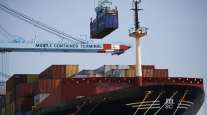Chassis Issues Continue to Trouble Truckers as Intermodal Freight Grows, Official Says
This story appears in the March 3 print edition of Transport Topics.
PHOENIX — The process of supplying chassis to truckers that handle international shipments is still fraught with confusion because of terminal delays and inadequate incentives for leasing companies to acquire new equipment, an industry executive said.
“There has to be a new chassis model,” said Robert Thull, CEO of Milestone Equipment Holdings, in Mill Valley, Calif., whose 40,000 pieces of equipment include intermodal trailers, containers and chassis, as well as highway trailers. “Marine chassis pools are still one of the challenges for intermodal to modernize.”
Thull, who has nearly 40 years of experience in the intermodal industry, said the transition from ocean carrier ownership of chassis to lessors as the primary provider has created multiple challenges. The transition began almost five years ago, when the largest ocean carrier, Maersk, stopped providing chassis to truckers at no cost, and competitors followed.
“The new chassis model has been very difficult,” Thull said at the Equipment Leasing and Finance Association meeting here Feb. 25.
Leasing companies have acquired hundreds of thousands of chassis as ocean carriers exited the business. Chassis equipment condition has been a long-standing concern of truckers, who have complained that the equipment made available to them leaves them vulnerable to roadside violations.
American Trucking Associations’ Intermodal Motor Carrier Conference has been pressing the Federal Motor Carrier Safety Administration to crack down on equipment providers.
Lessors are struggling to come up with an approach that would encourage investment in newer chassis, Thull explained, because they currently make more money renting old equipment acquired at a low price.
He noted that some older chassis can be bought for about half, or less, of the new equipment price of $10,000.
Thull said equipment delays continue to be an issue in some terminals, particularly rail facilities where a trucker who drops off a load often has to leave the chassis and find another one that is serviceable. The process of finding another chassis can lead to delays for truckers.
Thull also said the chassis process is working better generally inside marine terminals, where truckers usually aren’t delayed finding a new load after one is dropped off.
“Everything [else] is very, very positive for intermodal,” he said. “The industry has matured. In the past, you’d know when the train would arrive. Now, they are dialed in very well.”
Truck/rail freight should continue to grow at 3 percentage points faster than truckload freight over the next decade, Thull said, as a result of the driver shortage, truck/rail cost advantages and stricter government regulation.
“Intermodal is a good investment,” he said, because of factors such as “very attractive returns,” long life and cash flow.
Thull also forecast higher prices for new and used equipment.




